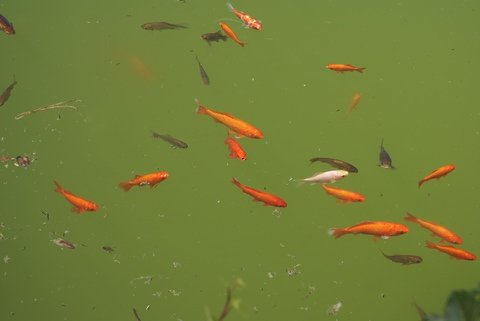| Back to Back Issues Page |
 |
|
The Goldfish Gazette, Issue #129 Pond Overpopulation September 29, 2024 |
Goldfish Care TipsA Free Monthly Resource For Goldfish Enthusiasts In This Issue Well maintained ponds provide ideal breeding environments for Goldfish. Pond Overpopulation
Unless dealt with, pond overpopulation can lead to several problems including poor water quality, increased disease risk, and stunted growth for your fish. First, let's understand why pond overpopulation happens. Goldfish are prolific breeders, especially in a well-maintained, well planted pond. When conditions are favorable, Goldfish can spawn multiple times in a season, leading to a population explosion. If you see a pond full of small fish, usually in early summer, it's a clear sign that your Goldfish have had a successful spawning. Juvenile Development and Sales PotentialIf the parents are Commons or Comets, the juveniles should be easy to dispose of, although unless the pond is covered fish that color early (desirable), are the first to be predated because they are easier to see.If your pond has fancy varieties with twin tails, there will be a high number of single tailed fish, because they can move faster than their twin tailed siblings. If you have mixed fancy varieties, the resulting juveniles may only be good for giving away. Whatever the parents, the juveniles will be undersized and hungry. After hatching they will have depleted all small animal life in the pond fairly quickly. They won’t be getting many leftovers from the parent feedings and to feed enough food to properly sustain the possibly hundreds of juveniles will quickly lead to water quality problems. Immediate SolutionsWhile the juveniles are small, they don’t pose much of a problem, but a number will survive and your pond bio-load will increase.If your pond is small and the water is clear, netting out the majority of the fish is an option. If your pond is heavily planted the most efficient way will be to empty it. If your pond is too large to empty, using a bait catcher is an option. Reducing the amount of aquatic plant life such as water hyacinth or clumps of Elodea will reduce hiding opportunities. Water lilies are fine as they don’t afford many hiding opportunities unless densely clumped. Long Term SolutionsIf you don’t have that many fish in your pond, a simple solution is to limit the fish to one gender. I would suggest males to avoid egg compaction problems or egg scattering that could lead to water pollution.Introducing another fish species such as mosquito fish (Gambusia affinis/holbrooki) which are small cold-water species similar to the guppy is a possible solution as they usually keep to the edges of ponds where Goldfish fry tend to congregate to avoid the larger fish. Minimizing aquatic plants limits the places to spawn and fry to hide, but the downside is nitrate absorption is reduced. Disposal of Excess FishA lot depends on the quality and size of the fish. Commons and Comets should be easy to dispose of if they are colored. Single tailed fancies or uncolored fish will be a problem to sell or give away.I use online markets such as eBay or Facebook Marketplace to sell my breeding culls. In conclusion, Goldfish pond overpopulation is a common issue but one that can be managed with the right strategies. If you let nature take its course, over a short period of time the most likely fish to survive, which are the single tailed uncolored specimens, will quickly become dominant. Another issue is you need to drop the number of fish in the pond before autumn. Autumn is the time Goldfish put on fat for the winter, and if the fish population are under-fed in late autumn, you will have die-offs in early spring. Comments? Ideas? Feedback? I'd love to hear from you. Just reply to this e-zine and tell me what you think, or what topics you want to be covered. Next Month's Topic Feeding Competition Revisitedwww.facebook.com/aboutgoldfish |
| Back to Back Issues Page |
